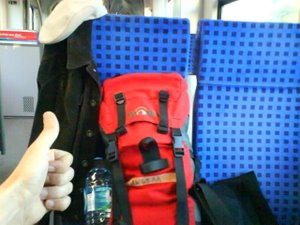
Bus leaves, picking up passengers along the road. Driver is a second Fangio, drives like there is no tomorrow, like a henker, at the same time honking, shouting at the street, into his cell phone he constantly holds onto his ear. The car has the urge to fall apart under the high speed and the shockwaves sent by deep holes of the road. I am calm. I have no fear. I believe at that point, the probability is quite high the driver and the car do this kind of ride every day without anything happening. The other passengers stay calm too. I accept the driving style as a tradition of this culture. Or, to put it another way: If life ends, it ends. If I die, I hope fast, without undue pain.
 The rallye Tirana -> Saranda continues, we pass the beautiful landscape of Albania. A mountain area it is, with high white peaks and green valleys. The coast is always nearby. I got the impression there are not many settlements. We pass some villages, but no city. Maybe I get to know this part of the country better someday. We pass a military base near Gjirokaster. I spot a single soldier standing guard with a shotgun. Even though I did not see many armed forces, military is present to me much more in this country than in a western european state. The cause might be some associations of violence and threat I bear with Albania, like Kosovo, the flag (it looks menacing to me), some post-communist/post-facist structures and monuments in Tirana. However these are all subtle feelings, and I experienced no single personal threat in Albania yet. So maybe the subtle associations add up to this feeling of armed forces presence, or I might have missed something.
The rallye Tirana -> Saranda continues, we pass the beautiful landscape of Albania. A mountain area it is, with high white peaks and green valleys. The coast is always nearby. I got the impression there are not many settlements. We pass some villages, but no city. Maybe I get to know this part of the country better someday. We pass a military base near Gjirokaster. I spot a single soldier standing guard with a shotgun. Even though I did not see many armed forces, military is present to me much more in this country than in a western european state. The cause might be some associations of violence and threat I bear with Albania, like Kosovo, the flag (it looks menacing to me), some post-communist/post-facist structures and monuments in Tirana. However these are all subtle feelings, and I experienced no single personal threat in Albania yet. So maybe the subtle associations add up to this feeling of armed forces presence, or I might have missed something.I am the rich foreigner in this country, and I cannot communicate well with the local residents. So I, too, experience some paranoia: I judge people, for example the passengers on my bus, by their looks. The darker their skin, the poorer their clothing, the gloomier their looks, the scruffier their face, the less I trust them. This must be a self-protecting pattern-matching mechanism, triggering emotions. This pattern-matching might go wrong, but if it protects me from one single hazard, it outweighs a lot of missed chances, I think.
 We arrive at Saranda and I am happy to see the sea again. First impression of Saranda: Everything seems to be under construction. Most buildings and roads I get to see are in a half-finished state, other are finished but old and rotten. The sun does not shine. I am a bit disappointed. Maybe my headache from the bus trip focuses my view too much negative impressions and make me hypercritical.
We arrive at Saranda and I am happy to see the sea again. First impression of Saranda: Everything seems to be under construction. Most buildings and roads I get to see are in a half-finished state, other are finished but old and rotten. The sun does not shine. I am a bit disappointed. Maybe my headache from the bus trip focuses my view too much negative impressions and make me hypercritical.
I decide to get to a hotel soon and have some rest. I ignore the "hotel? hotel?" people running after me, they annoy me, and head straight to the seaside where I select the nearest hotel. I go to my room and sleep.





